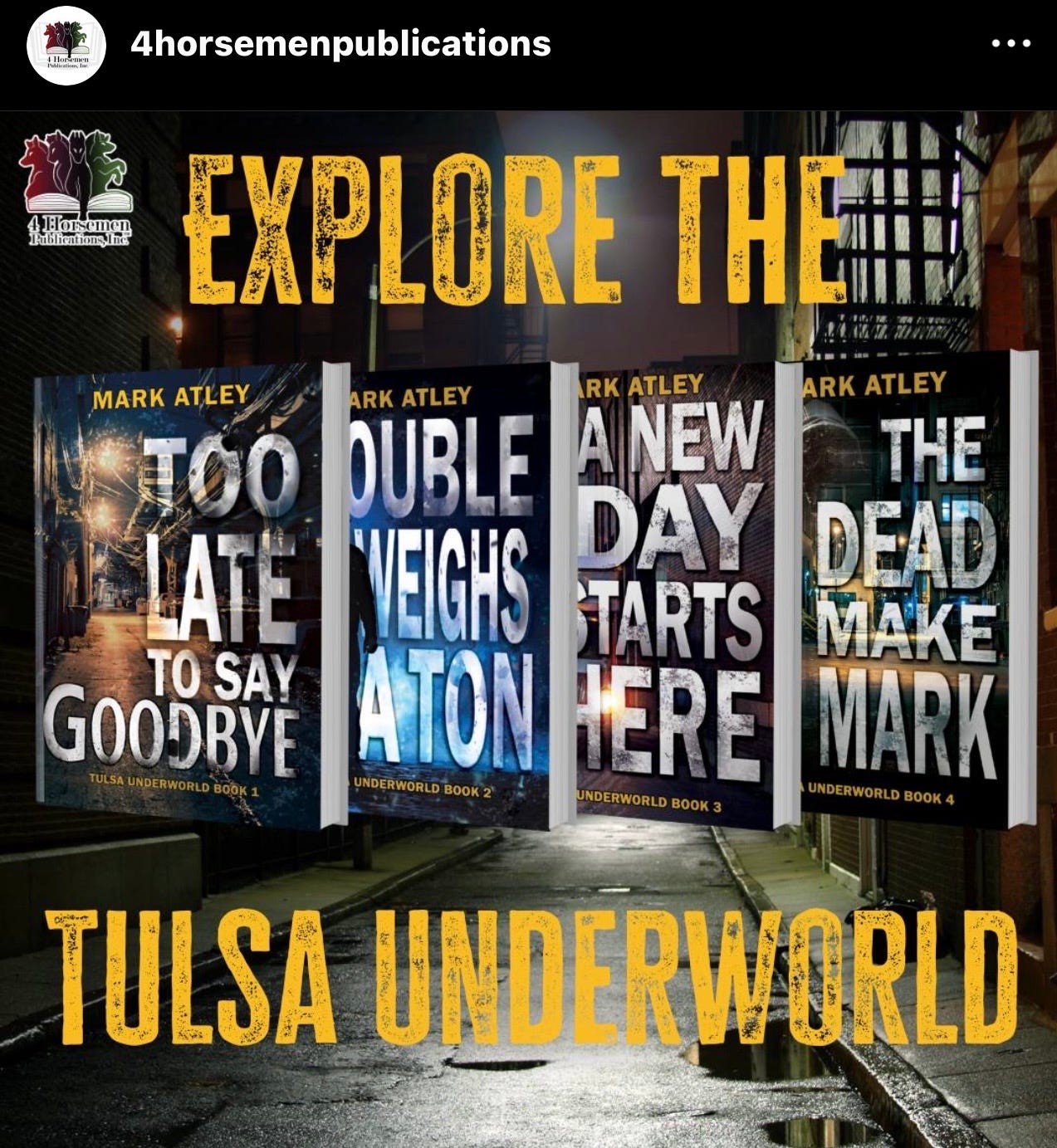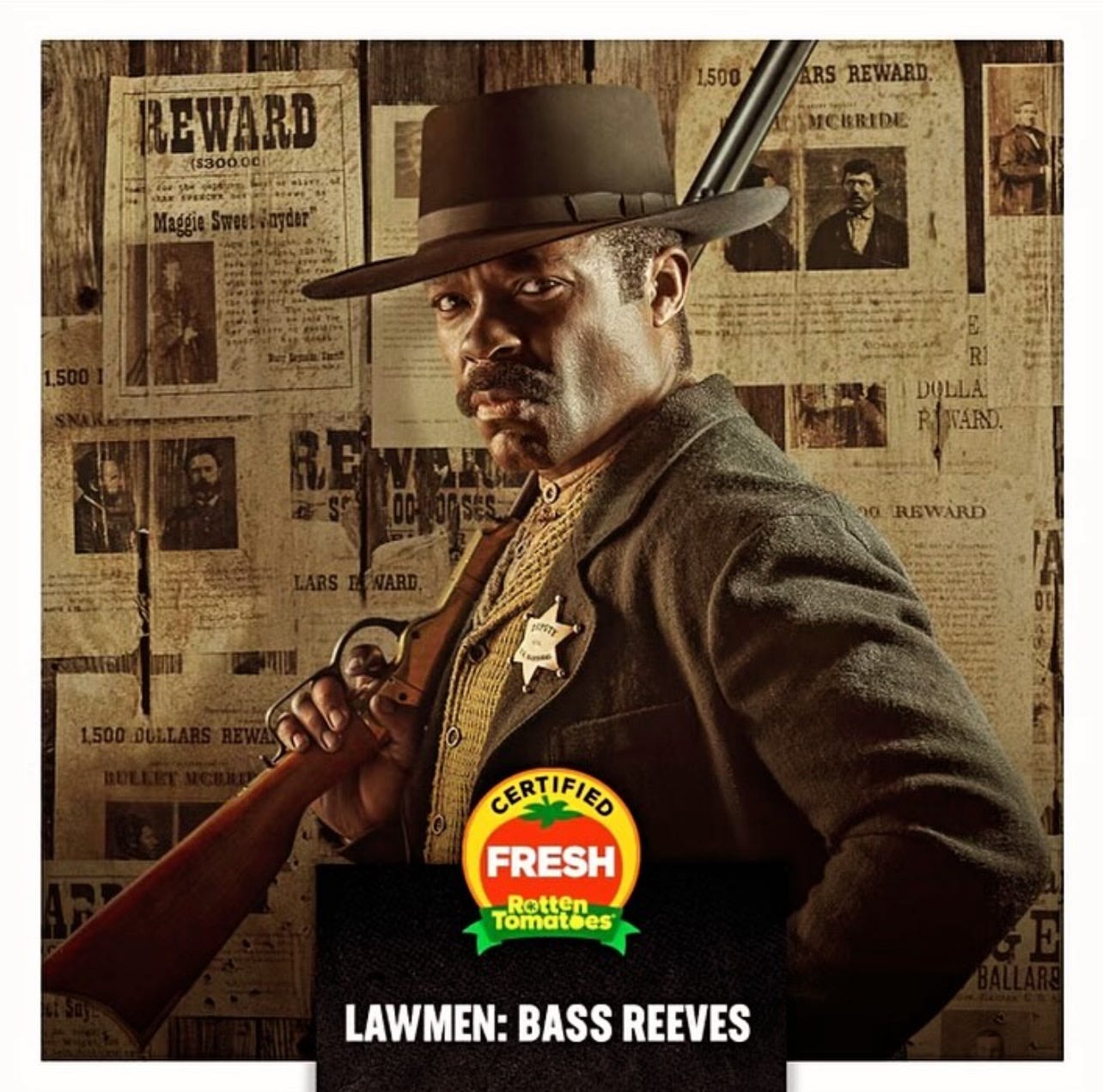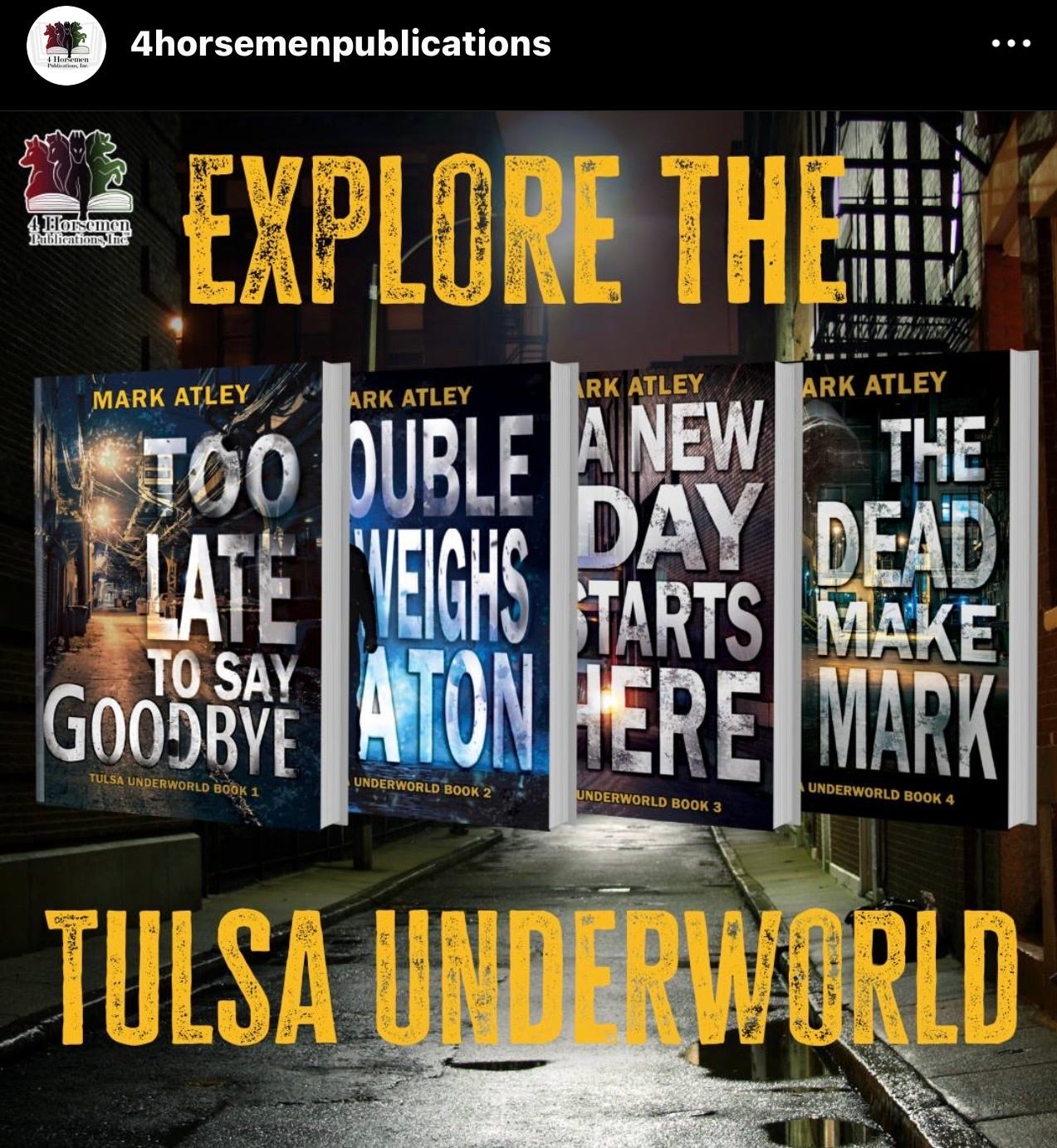A retired federal law enforcement agent with thirty years of experience, J. Todd Scott was a finalist for the 2024 International Thriller Writers Award for Best Paperback Original and is the critically acclaimed author of six crime, suspense, and thriller novels. He is also a film and TV producer and screenwriter, most recently for the Paramount+ series Lawmen: Bass Reeves.
His latest novel, the thriller The Lightning Tree, comes out later this year.
Hello everyone, and welcome to "1 on 1 with Me!" In this series, I highlight a new author and engage in a thoughtful conversation about who they are, what they care about, and their perspectives on various topics. I start with standard questions and then move into tailored follow-ups based on their responses.
I find the format to be conversational, and I truly enjoy it. My primary focus is to highlight the author I am interviewing.
Who am I? I am an author known for creating crime fiction, with a particular focus on complex characters, engaging dialogue, and narratives centered around crime themes. I genuinely enjoy listening to people and letting them share their stories.
If you are interested in being a guest, please reach out to me on social media or email me with the subject line: "Author Interview." This initiative is my way of giving back to the writing community. The guests you’ll hear from in these interviews come from diverse backgrounds, and they may or may not be familiar voices in the writing community. That’s the beauty of this platform on Substack—it's free!
My values
—Everyone matters.
—Be positive.
—Gratitude in everything.
—Default action is compassion.
—Empathy. Always.
—Motivations matter
—Fight for Resolution
—Resist Fear; embrace love
—Practice Hospitality
—Expectation isn’t communication.
HELP ME HELP THESE AWESOME PEOPLE!
Share these interviews on social media. That’s the best way for others to find this series and enjoy the words of wisdom these people will bring to your life.
Subscribe to my Substack or follow me on social media such as BlueSky, Threads, X (Twitter), and Instagram.
Share links. Share posts. Share thoughts.
Remember to always choose positivity over negativity.
Check out my books and drop a review. Like RedBull, reviews give author’s wings.
On to the interview!
J. Todd Scott
A personal writing mentor and cheerleader. He’s a much better writer than I am but he’s been so kind to me through the years .
Who are you and can you tell me a little about your work? What drives you? What do you hope to accomplish?
I’m a (recently) retired federal agent, after carrying a badge and gun for thirty years. But around 2011 or so, I decided to try my hand at writing, something that was always a passion of mine, but never pursued seriously after leaving college. Those first forays led to my debut novel, The Far Empty, and I’ve published five more since, all penned while still working as a federal agent. My latest novel comes out in October or November, the first to publish when I can call myself a “full time author.” I’m passionate about storytelling, and strive to tell entertaining and thought-provoking stories, wherever those might lead me or spring from.
How do you see your relationship with the reader?
An honest one. I’m not trying to be someone I’m not or author stories other than those that truly animate me. That can be disconcerting for readers who like some of my books but not the others, because I am so willing to bounce around genres and try different things. I hope readers will follow me down all the darks paths I want to explore and find those things they like about my work in every book I write, but I know the risk. Still, if I’m going to devote months to drafting a novel, it’s got to be a story I want to read to myself, if no one else.
How do you view your characters? What has changed over time, and what has stayed the same? How do you develop complex characters?
I start almost all my books with characters, a character facing a problem, and then usually back in my way into the wider plot (sometimes easier said than done). I enjoy the messiness of characters, their inner lives and the lies they tell themselves, the push and pull of the things they say, and the tension of characters bouncing off each other. I’ve always been fascinated by bad choices and the collateral damage of those choices. I don’t “try” to develop complex characters, I just write about “real” people, or at least interesting ones.
What is your version of success? Has it changed during your writing journey? How so? What’s different now versus when you started?
The easy answer is I’m already wildly successful—I’ve realized a lifelong dream of writing a novel and seeing it published (and was able to parlay that into film and TV writing as well). But anyone who’s making the transition from writer to published author knows that there are a lot of benchmarks for success—some professional, some personal, some creative, some business—and some more important than others, if you want to stay a published author. That’s the nature of things whenever art crosses commerce. While this is creative and artistic work, it’s also a tough, tough industry, so I keep a quote penned up near my keyboard: Rejection is the standard, not the exception. I always assume each published book might be the last, but I never believe any book will be the last one I write. A “professional publishing career” can be taken away, but writing itself, storytelling, is what I do, it’s who I am, and no one can take that way.
What type of reader are you? How do you view books you read, and how do they affect you and your writing?
I’m a much less patient reader than I used to be. I was a voracious reader for years and years, and I’m glad I was, but if a book doesn’t reach me now in some way, I’m much more inclined to put it aside. There are so many books, so few hours, and honestly, most of the time I’d rather be writing my own stuff. But reading is critical, and it refills the creative tanks, refreshes the wellspring, and if I read some good stuff, it absolutely pushes me to strive harder, to “level up” my craft.
How do you find readers? What works and hasn’t worked for you? What resonates with you when readers share thoughts about your work? And where do you see yourself in the writing community and publishing world?
I don’t try to “find” readers, not in any concerted way. I do all the social media things that’s expected of a professional author nowadays, but I’m not sure if any of that moves the needle. Up until this past year, writing (and my publishing career) was simply something I shoehorned in while focusing on my very demanding real career as a federal agent. So, I have zero perception of myself in the writing community or publishing world, and I’m not sure I have much control over that or care about it. I simply try to be respectful to anyone who approaches me about my work (or theirs), I try to be honest, and I look for ways to support and promote other writers whenever and however I can. I know I’ve been extremely fortunate to be published, but I’m also cognizant that’s as much timing and luck as anything else, so I never take it for granted, or believe it’s a final referendum on me as a writer, good or bad. All I can do—all I can control—is write the kinds of stories that interest me in the most creative, entertaining voice I can, and hope they interest and entertain some other folks as well.
—Tell me something interesting about yourself that these questions stimulated thought about. And tell me something you want others to know.
Because of the success of my books, I’ve been involved in film and TV writing—screenplays—which is an entirely different “language” from novel writing. I’ve enjoyed the challenge, and I think learning screenwriting has helped me on the novel side as well. In fact, I’m set to relocate to Los Angeles for the next five months to work on a pending streaming series.
Where did the drive for screenwriting and TV work originate? Did it come from adapting your own work? Or did you always have this idea and once you hit a goal of getting a novel (or several) published that you decided to follow the new dream?
I’d like to say there was some strategic thought put into the whole screenwriting thing, but it truly was a product of luck and opportunity. As my novels were being optioned for film and TV projects, I got to meet folks (later, mentors) in the industry who liked my work and gave me the chance to not only adapt my own work, but help on other projects (a feature film here, a TV pilot there), which eventually led to Lawmen: Bass Reeves.
I quite enjoyed Bass Reeves. How did you find your way to that project? What can you share with us about the project? The ups and downs..the plus sides….that sort of thing.
As I said, I’ve been lucky to have a few mentors in the industry, folks who’ve taken me under their wings, and when one of those mentors became the showrunner for Bass, he asked if I wanted to come out to LA for a couple of weeks and serve as a consulting producer. It was a chance to see TV writing from “the inside,” and an opportunity to decide if it might be something I’d want to pursue post-DEA—remember that I was doing all this while still working fulltime as a federal agent! I enjoyed my brief exposure to a writer’s room, even got to go to set in Texas for filming and was ultimately assigned my own episode to write (Episode 4, titled Myth). The experience was phenomenal; it’s hard to adequately describe the thrill of seeing your own words acted out on screen, to see the locations you’ve described and written about come alive. But because it was such a massive, expensive show facing a tremendously difficult shooting schedule (lots of animals and outdoor scenes, where weather was always a problem), I came to understand just how stressful a production at this level can be for everyone involved.
How is retirement treating you? How has your family handled the transition? Was there ever anyone in your life that encouraged you to be a writer? What did they say to you? What do you remember?
I was “truly retired” for about a year, and for most of that time, I enjoyed the best kind of writer’s life, the so-called “dream”—working at home on my own books and screenplays, without the pressure of juggling a day job or even deadlines. I truly settled into a quiet life of reading and writing. DEA has a mandatory retirement age, so I long knew I was facing that day when I could no longer carry a badge and gun, and although agents often struggle with the transition into normal or civilian life, my writing career had emotionally prepared me to do something else I already loved. Similarly, my family loved having me around, without the stress and long hours of law enforcement. However, two months ago, I got offered the chance to be a producer on the upcoming Beth and Rip spinoff for Yellowstone, so I’m now out in Los Angeles, working fulltime yet again. I also recently co-wrote a feature film script that just sold and is being prepped for filming later this year and have another TV show on deck. So, my “retirement” didn’t last long as I thought! However, all this film and TV stuff could disappear in an instant (the business is ever evolving, and I’m still a neophyte, in many ways), but I’ll ride the wave long as it holds me up.
What sort of books do you find yourself leaning to now? Often, readers tend to toe impatient with narratives as you’ve mention but always have a sweet spot for certain types of stories. What is yours?
If you mean what sort of books or stories I’m leaning into writing, I’d say they’re trending towards suspense/horror/thriller, as opposed to the more procedural or straight crime novels that I was originally known for. But honestly, and probably to my detriment, I’ve always just written whatever interested me, wherever my stories took me. I’ve had an incredible career as a novelist, but I’ve never been a bestseller, or ever considered a breakout star. Years ago, I might’ve been classified as a mid-list author, although I’m not sure that even exists anymore. Being a bestseller would be great, it also comes with expectations all its own, while I’ve been able to bounce genres, explore stories that interest me, without those burdens. But that also means publishing is a tenuous existence; each book is a referendum on whether I’ll get another one published. Nevertheless, I’ll just keep writing my stories, whatever kinds of stories they are, and hope to find folks to publish and support them, for as long as I can.
Why are you such a nice and generous guy?
Thanks, I want to believe I am! I know that I’ve been very fortunate in this industry. Getting published is a combination of luck and timing and less about true talent or skill. Because I’ve never taken a moment of this for granted or ever believed either the best or the worst of my reviews, I just revel in the incredible opportunities I’ve been afforded and extend them to others in every way I can. I’ve had great mentors and friends who’ve helped at every turn, and I can’t imagine not doing the same. And because I’ve already had a long, incredibly fulfilling career as a federal agent (a job I truly loved), I think I have a healthy perspective on writing and the “second career” I’ve made of it. If it all went away tomorrow, I’d be thankful for it, but life would go on. I’d still keep writing, even if it was only for an audience of one.
A retired federal law enforcement agent with thirty years of experience, J. Todd Scott was a finalist for the 2024 International Thriller Writers Award for Best Paperback Original and is the critically acclaimed author of six crime, suspense, and thriller novels. He is also a film and TV producer and screenwriter, most recently for the Paramount+ series Lawmen: Bass Reeves.
His latest novel, the thriller The Lightning Tree, comes out later this year.
Mark Atley is known for writing crime fiction, with his works often characterized by complex characters, engaging dialogue, and narratives that build tension towards explosive climaxes.
Atley's approach to writing often involves creating intricate plots where characters' histories and motives are deeply interwoven, providing readers with both entertainment and a commentary on crime and morality. His work has been featured on platforms like Audible for audiobooks, indicating a broad reach in the crime fiction genre.
Mark Atley also engages with his audience through social media, where he can be followed for updates on new releases and insights into his writing process









Cool interview, Mark!
Nice interview. As always insightful and intertaining.